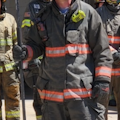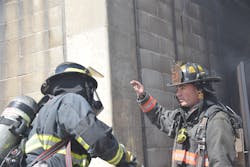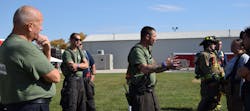Fire Instruction: Be a Good Student First and Always
Close your eyes and identify two fire instructors: the best that you encountered, then the worst. Do you remember their names, their facial expressions, the qualities that made them relevant? Probably all of us can, and it might be that the worst instructors had the greatest effect. Those self-gratifying few established the qualities of what a terrible instructor is—they didn’t understand the information and they were poorly prepared, which resulted in their inability to change their poor performance.
A dedicated student commits to learning, and a dedicated instructor continues that commitment.
Editor’s note: The insight that’s provided below is presented from two perspectives, the first (Levy) of a relatively new fire instructor; the second (Vega) derives from a more veteran instructor.
The opportunity to instruct
LEVY: Getting started as a new instructor can be a difficult task to accomplish. For one, there is no shortage of individuals who want to be instructors. Therefore, it’s incumbent on you to set yourself apart from the other firefighters who want to join a program of instruction.
My first recommendation for a new instructor who is attempting to get instructional opportunities is to never stop being a student. This makes you a better firefighter and a better instructor.
When you are in a class, don’t call attention to the fact that you are a fire service instructor; exercise humility. Study hard and focus on demonstrating skill acquisition. This was a significant component of my success in many of the instructional opportunities that I received.
My second recommendation: Once you begin instructing, remember where you came from. The fire service is a small place, and the instructional world is an even smaller place. If you earn a reputation for lacking humility or being lazy, you can destroy your future opportunities.
Learn more than you instruct
VEGA: No matter the time that you have on the job or the arena of instruction, learning is a foundational constant. It doesn’t and shouldn’t cease when you become an instructor. Immerse yourself in magazines, studies and journals.
Be wary of relying on social media as the sole source for your information. Of course, the means to connect with others and to seek mentorship through social platforms is invaluable, but challenge your views. Don’t cherry-pick information that serves as confirmation of those views.
All information and opinions should be vetted, and established sources that inspire and shape your style should be cited. The longer that you instruct, the more that you should realize how much you didn’t understand what you first knew, so the gratitude that you show in citation is priceless to those who did the work before you.
When I meet instructors, I ask about the last class that they took or the last lecture that they attended. When instructors respond with, in so many words, that the summation of their education is listening to themselves, I can’t help but lose faith in those instructors.Learning how to instruct
LEVY: As a new instructor, the world of fire service instruction can seem intimidating. There are many great instructors out there, and I have been blessed to instruct alongside some of the best of them. That said, I never missed an opportunity to observe how they instructed: the tone of their voice, their methods, how they put emphasis on something and what they demonstrated.
Fire Instructor I teaches that the hallmark of any instruction is knowing the objectives that must be taught. The curriculum is then taught to ensure comprehension of those objectives.
Teach from your knowledge base, teach the curriculum, hit the objectives. Own who you are and the base from which you teach.
When I teach about standpipe systems and high-rise operations, I don’t speak as though I have multiple high-rise fires per day: My community has two eight-story buildings; that’s it.
If I have some experience in an area in addition to my knowledge base, I can speak from that experience, but the intent isn’t to be telling war stories. It’s to provide relevant context to the information that’s being presented to the students.
Train more than you instruct
VEGA: Instructors should dedicate themselves to training in their time off. Training relentlessly. I’d say 100 times more than the time that they spend providing instruction. The time that’s invested in one hour of instruction should be the summation of countless hours of training.
All of us have been in a class where an instructor was unprepared, unfocused and so far off of the objectives that our time was wasted. So, prepare harder than anyone else. Find those who challenge you to be better and seek out their drive.
When you come across an instructor who performs with relentless drive, recognize it and encourage it. They worked hard to attain that skill by the sacrifice of their time.
A good instructor is a student who fails but, with relentless drive, continues to improve. Training allows the space for failure, be it the skill that’s being taught or the lesson that’s being instructed. Failure is a constant in training. It’s the key to refining a skill to success. However, if the instructor fails at instructing in the first place, the skill never will be shared.
Confidence via instruction
LEVY: Fire service instructors might face naysayers. Undoubtedly, dealing with these people could be a struggle.
The fire service is filled with individuals who are a Type A personality. Additionally, members of the fire service tend to be ego-driven, particularly in their most daring, difficult and dangerous tasks. Sometimes, it’s difficult for individuals who are younger or who have less seniority than those who they are instructing to be taken seriously when they teach. It’s important to remember that, at its root, this problem has nothing to do with who you are or what you are teaching.
As noted above, teach from your knowledge base. Supplement the information with relevant experiences. Don’t get derailed arguing over your qualifications to teach. Someone put you on that training ground; you require no further validation.
Furthermore, always be respectful. Suspend your ego and recognize that some students might have useful input.
Apply what you instruct
VEGA: Good instructors will be challenged, because they foster an environment of open respect. Build environments with your cadre and students that recognize and improve shortcomings in your delivery.
When instructors apply their discipline in the real world, it builds confidence and adds credibility to what they share in the classroom or on the training ground. Not every firefighter has the countless experience of back-to-back fires, but all firefighters have their next fire. A good instructor efforts to apply those skills, because they work and because they are based on fact.
I won’t teach anything that I haven’t become autonomous in application. My process relates that, for success, I must first learn, then train, then work. It’s based on a model that was introduced to me by Aaron Fields while I took the class “The Nozzle Forward” in 2015. Further, the Fitts Posner Model of Psychomotor Acquisition establishes a hierarchy that identifies in what phases—the cognitive, the associative and the autonomous—that a learner acquires a skill(s). A good instructor must be autonomous when sharing a skill, and working within this model serves as the basis for that success.
Responsibility
Senior instructors must care: to continuously learn, to constantly train, to perform excellently, to share failures, to admit mistakes, to change bad habits, to face criticisms, to raise others above themselves, to find someone to replace them, to invest in their success and to never need to be thanked.
About the Author

Ed Levy
Ed Levy is a career firefighter with the Streator, IL, Fire Department. He has been with the department since 2016. Levy is the program manager for the First Responder Resiliency Project and the Leadership Development and Decision Making program and has served as an instructor in several firefighting programs at the Illinois Fire Service Institute.

Sam Vega
Sammy Vega is a career firefighter with the Calumet City, IL, Fire Department. He has been with the department since 2005. Vega is a line engineer and serves as the department’s training officer. He is the program manager for engine company operations at the Illinois Fire Service Institute and has taught at various fire conferences.

